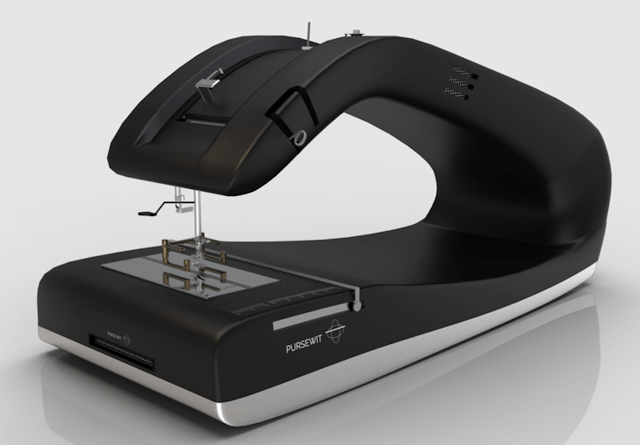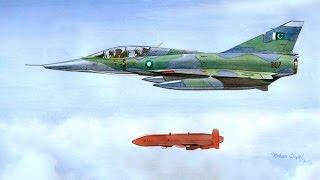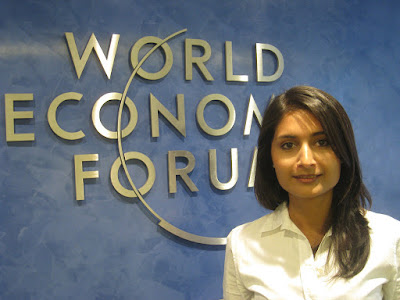Pakistani Woman Industrial Designer Wins Lexus Global Design Award
Aqsa Ajmal, a graduate of Pakistan's National University of Science and Technology, is among six finalists for Lexus Design Award 2020 for industrial design. Each of these finalists will receive 3 million Yen (over $25,000) in funding and mentorship in an exclusive program in New York City under the guidance of prominent design leaders from a variety of design fields.
Aqsa's entry is named Pursewit. The device provides an easier way to incorporate sewing skills into income generation for the blind who rely upon touch and other senses. The thread path is much more simplified and streamlined; the user follows a straight, outlined path from the spool pin to the machine’s arm and through a loop, then down to the needle. The machine provides feedback at each step to ensure the process is completed, according to Lexus.
Aqsa's entry ranked among the top 6 from 2,042 submissions from 79 countries. The other finalists are from the China, France, Italy, Kenya, Russia and the United States.
Lexus describes Lexus Design Award competition as follows:
"Lexus Design Award provides a unique platform for young creators to demonstrate and further develop their talents. Founded in 2013 to support and foster up-and-coming creators, the program continues to evolve to inspire innovations in design that lead to a better tomorrow, and each year has seen a steady increase in number of entries from across the world. Last year, creators from 65 countries submitted 1,548 design proposals, many of which leveraged the power of technology."
Growing numbers of young Pakistanis are now participating and winning in international design and engineering competitions. Recent examples include Stanford Design Contest, AI Family Challenge World Championship and International Genetically Engineered Machine Competition. These wins offer increasing evidence of Pakistan's expected demographic dividend.
Related Links:
Haq's Musings
South Asia Investor Review
Pakistani Students Win First Place in Stanford Design Contest
Pakistanis Win AI Family Challenge in Silicon Valley
Pakistani Gamer Wins ESPN E-sports Player of the Year Award
Pakistan's Expected Demographic Dividend
Pakistan's Research Output Growing Fastest in the World
AI Research at NED University Funded By Silicon Valley NEDians
Pakistan Hi-Tech Exports Exceed A Billion US Dollars in 2018
Pakistan Becomes CERN Member
Pakistani Tech Unicorns
Rising College Enrollment in Pakistan
Pakistani Universities Listed Among Asia's Top 500 Jump From 16 to 23 in One Year
Pakistani Students Win Genetic Engineering Competition
Human Capital Growth in Pakistan
Pakistan Joins 3D Print Revolution
Pakistan Human Development in Musharraf Years
 |
| Pursewit Sewing Machine. Source: Lexus |
Aqsa's entry is named Pursewit. The device provides an easier way to incorporate sewing skills into income generation for the blind who rely upon touch and other senses. The thread path is much more simplified and streamlined; the user follows a straight, outlined path from the spool pin to the machine’s arm and through a loop, then down to the needle. The machine provides feedback at each step to ensure the process is completed, according to Lexus.
 |
| Aqsa Ajmal. Photo Credit Lexus |
Lexus describes Lexus Design Award competition as follows:
"Lexus Design Award provides a unique platform for young creators to demonstrate and further develop their talents. Founded in 2013 to support and foster up-and-coming creators, the program continues to evolve to inspire innovations in design that lead to a better tomorrow, and each year has seen a steady increase in number of entries from across the world. Last year, creators from 65 countries submitted 1,548 design proposals, many of which leveraged the power of technology."
Growing numbers of young Pakistanis are now participating and winning in international design and engineering competitions. Recent examples include Stanford Design Contest, AI Family Challenge World Championship and International Genetically Engineered Machine Competition. These wins offer increasing evidence of Pakistan's expected demographic dividend.
Related Links:
Haq's Musings
South Asia Investor Review
Pakistani Students Win First Place in Stanford Design Contest
Pakistanis Win AI Family Challenge in Silicon Valley
Pakistani Gamer Wins ESPN E-sports Player of the Year Award
Pakistan's Expected Demographic Dividend
Pakistan's Research Output Growing Fastest in the World
AI Research at NED University Funded By Silicon Valley NEDians
Pakistan Hi-Tech Exports Exceed A Billion US Dollars in 2018
Pakistan Becomes CERN Member
Pakistani Tech Unicorns
Rising College Enrollment in Pakistan
Pakistani Universities Listed Among Asia's Top 500 Jump From 16 to 23 in One Year
Pakistani Students Win Genetic Engineering Competition
Human Capital Growth in Pakistan
Pakistan Joins 3D Print Revolution
Pakistan Human Development in Musharraf Years



Comments
By Adeela Akmal Tue, 02, 20
In light of International Day of Women & Girls in Science, this week You! exclusively talks to Zartaj about her exhilarating journey and ventures...
https://www.thenews.com.pk/magazine/you/611861-bridging-the-stem-gap
You! Why do you think space exploration needs to be talked about in Pakistan?
ZW: Space exploration is a very inclusive affair. It requires people from all walks of life and professions to support it and help it grow. Space exploration is one of the yardsticks by which a country’s scientific journey and progress are measured. Pakistan, unfortunately, is very low on that scale. There is little to no awareness for space exploration, space sciences and other associated fields. By bringing about awareness to these topics we’re navigating our younger generation to embrace the mysticism of space and answer some of its toughest questions.
You! Where does Pakistan stand in terms of Robotics on a global scale?
ZW: I’ve been taking robotics teams to international competitions all around the world since 2014. Our students are truly very gifted. However, when we go to these competitions, we lose sight of the spirit of competition and we’re only hung up on winning. With such mindsets, we go to extremes to make sure our teams and students win, even if it is not their hard work. This mindset needs to be quashed. Our students need to participate, excel and win on their own merit. This issue is a multi-faceted problem and hence the efforts need to be made in two to three dimensions. Starting from grassroots, we need to impart robotics education as part of the curriculum. Currently, very few schools participate in some international robotics programmes launched in Pakistan recently but haven’t been able to grow because of the upfront costs, costs of participation, etc. Research being conducted at universities is limited to publishing papers only and not followed through. There is a need for the application of this research and for creating opportunities in the field of robotics for people to work.
You! What is the market like for tech entrepreneurship in Pakistan and is there a niche for women?
ZW: Pakistan has one of the youngest populations in the world. This population adapts to technology very quickly and makes it a part and parcel of their daily lives. With this progress in Pakistan, the market is ripe for tech entrepreneurship ventures. Moreover, there are invigorating ventures in Pakistan that are solely aimed at bringing women entrepreneurs to the forefront such as SheLovesTech by Circle, WomenInTech by Pakistan Innovation Foundation & Standard Chartered, etc. In Pakistan, tech entrepreneurship ecosystem for women remains challenging because women are considered not to have the requisite skill set as compared to their male counterparts.
You! There is a concept that there aren’t many women coming in the STEM field. What are your thoughts?
ZW: That is true in a country like Pakistan; there are very few women in the STEM field. However, in more developed countries the ratio of men and women in STEM workplaces is less biased.
You! They say that Science and Maths are subjects that one is naturally good at. Do you think that’s the case?
ZW: Not entirely true. Some students might have the edge over other students however with practice everyone can hone their skills.
US Embassy in Pakistan congratulates GIKI's Team Invictus for bagging second position
https://tribune.com.pk/story/2284783/pakistani-students-win-big-in-americas-design-build-and-fly-competition
The students of Ghulam Ishaq Khan Institute of Engineering Sciences and Technology (GIKI) participated in the Design, Build and Fly contest in the United States of America and bagged the second position. Team Invictus from GIKI managed to win the second prize in the competition hosted by American Institute of Aeronautics and Astronautics.
The competition had participation from students from all across the globe including renowned institutions such as MIT, UC Berkeley, and Stanford.
The 2021 iteration of the competition aimed to build and test a UAV with a towed sensor. All student teams were tasked to design, fabricate and demonstrate capabilities of their crewless radio-controlled aircraft, which is designed to meet a specific mission objective.
According to techjuice, GIKI's team used advanced manufacturing techniques which included 3D printed parts and a pod and boom aircraft configuration to get their design ready.
The prestigious contest is sponsored by the American Cessna Aircraft Company and Raytheon Missile Systems. The students of GIKI were also congratulated by the US Embassy in Pakistan on a Facebook post:
http://en.ce.cn/Insight/202207/27/t20220727_37911036.shtml
The competition, which was concluded in Shenzhen, China, attracted 150,000 students from more than 2,000 universities in 85 countries and regions. After national and regional competitions, 130 teams from 43 countries and regions faced off in the global final. Two teams from Pakistan participated in the Network Category of the Practice Competition with Team One clinching the 1st prize, and Team Two grabbing the 3rd prize.
Osman Ahsan Sheikh, Muhammad Abdullah Ahsan Sheikh and Aqsa Amir represented Team One ‘Homevism’, which comprised students from NUST. Team Two ‘Boltay Haroof’ from LUMS was represented by Umer Farooq, Tabish Rafiq and Areej. In the Innovation Competition, Team Boltay Haroof won the 2nd prize, while Team Homevism seized the 3rd prize.
Mr. Ahmed Bilal Masud, Deputy CEO of Huawei Pakistan, congratulated the winners and affirmed their infinite potential. On the occasion, he highlighted, “the competition is a great opportunity for Pakistani youth. Through this event, young Pakistanis have gained a deeper understanding of ICT and have a platform to make a name for themselves in the ICT industry.”
The star student of the winning team, Mr. Bhagchand, addressed the ceremony, saying “the Huawei ICT Competition served as a platform that allowed us to compete with and win against teams at regional and international levels for Pakistan.”
Sateesh Kumar, a Mehran University bachelor who came from a small town in Sindh, was motivated by his teacher to take part in the competition. He said it was an amazing initiative by Huawei, offering equal opportunities to engineering students all over Pakistan to showcase their talent, whether they’re from large bustling cities or small remote towns.
The next installation of the global event, The Huawei ICT Competition 2022, will be held under the theme ‘Connectivity, Honor, Future’. It will run from August to December and is a large part of Huawei’s commitment to nurturing the next generation of ICT leaders across the world.